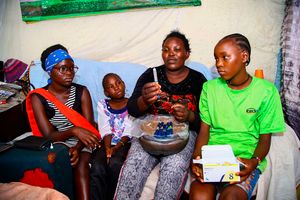Diabetes in children: Risk factors, warning signs and treatment

In diabetes mellitus type 1, the pancreas is unable to produce insulin because of destruction of the cells that produce insulin in the pancreas.
What you need to know:
- In diabetes mellitus type 1, the pancreas is unable to produce insulin because of destruction of the cells that produce insulin in the pancreas.
- Symptoms include frequently passing urine, excessive thirst, feeling hungry and eating frequently, unexplained weight loss, nausea, feeling tired and having blurred vision.
Dear doctor,
My friend’s son, who is nine years old, was recently diagnosed with diabetes and now has to inject himself with medication. How is this possible?
Viola
Dear Viola,
Diabetes mellitus is a disease where there is a problem with how the body handles blood sugar due to a lack of/or improper function of insulin. The blood sugar is generated from ingested food and mobilisation from internal body stores. This blood sugar then needs insulin for it to be taken up by the cells to be used as energy.
In diabetes mellitus type 1, the pancreas is unable to produce insulin because of destruction of the cells that produce insulin in the pancreas (the beta cells). This destruction is done by the individual’s own immune system, so it is an auto-immune disease. Diabetes mellitus (DM) type 1 starts in childhood or early adulthood, though some people may develop it later in life.
Diabetes mellitus (DM) type 2 develops due to a combination of factors including reduced insulin production; reduced functioning of the insulin in getting the cells to take up the blood glucose; and inappropriate or excessive production of glucagon. Glucagon is a hormone released by the pancreas that helps increase blood sugar levels to keep them from getting too low. Insulin and glucagon work together to regulate blood sugar levels. DM type 2 usually develops later in life, though a few people may develop it earlier. Its occurrence may be affected by genetics, obesity, diet and lifestyle factors.
It is likely that your friend’s son has type 1 diabetes. The auto-immune destruction of the beta cells of the pancreas is as a result of a complex genetic component and environmental risk factors. The environmental factors that may contribute to development of the disease include infection with some viruses, exposure to some toxic chemicals and exposure to cow milk during infancy.
Symptoms of type 1 diabetes include frequently passing urine, excessive thirst, feeling hungry and eating frequently, unexplained weight loss, nausea, feeling tired and having blurred vision. It can also cause diabetes ketoacidosis, which is a medical emergency due to elevated blood sugar levels and high levels of ketones in blood. Ketones are acidic metabolites of fatty acids. Diabetes type 1 is diagnosed through a number of laboratory tests.
The condition is managed through insulin therapy, which currently is only available in injectable form. Additionally, the individual and the caregiver need to carefully monitor the blood sugar levels and have a diet plan developed by a clinical nutritionist and regular exercise.
Dear doctor,
I am 42 years old, and in the last few months I have been having episodes of hiccups that can last even two whole days, then disappear. What could be causing this?
Nelson
Dear Nelson,
Hiccups, otherwise known as singultus, happen when the diaphragm contracts and the vocal cords close suddenly, producing the sound. The diaphragm is a sheet of muscle that is stretched across the bottom of the rib cage, and it moves up and down during breathing. During a hiccup, the diaphragm contracts suddenly in between breaths, making you suck in air quickly, and the glottis (the opening between the vocal cords) closes fast to prevent more air from coming in.
Hiccups usually last for only a few minutes and resolve by themselves. But occasionally, hiccups may last for more than 48 hours, and/or keep coming back.
Hiccups occur because of irritation of the nerves that are attached to the diaphragm. Hiccups that last a short duration may be as a result of swallowing a lot of air, eating too fast, eating too much, taking carbonated drinks or alcohol, smoking tobacco or bhang. Some people experience hiccups when they get excited suddenly or stressed, or when there are sudden temperature changes.
Persistent or recurrent hiccups may occur following some medical procedures or due to illnesses such as hyperacidity and reflux; some infections like flu, herpes; some lung conditions; problems with the brain and spinal cord; kidney failure; having low calcium levels and some tumours. There are also some medications that can trigger hiccups such as the antibiotic azithromycin, dexamethasone, low dose benzodiazepines and some chemotherapy medications.
Since you are experiencing hiccups for a prolonged period, and they keep recurring, it is advisable for you to be reviewed by a doctor so that the underlying cause is identified and treated. There are medications that can be prescribed to stop hiccups. Meanwhile, eat small portions of food at a time, and the food should be warm – not too hot, neither too cold. Eat and drink slowly, and avoid carbonated beverages and alcohol.
Dear doctor,
I found out I was pregnant about five months ago and then after three weeks, I bled and thought I had lost the pregnancy. I did not go to hospital that time and the bleeding stopped by itself. I have not had my periods since then, and I have not been feeling anything. Could I still be pregnant?
Dear reader,
After losing a pregnancy, sometimes there may be a delay in resuming the periods, and the duration varies for different individuals. In addition, bleeding does not always mean that the pregnancy is lost. There are also other factors that can affect your periods like hormonal imbalance and use of hormonal medications or contraceptives. The best way to know if the pregnancy is still there or not, or if there is any other problem, is to be reviewed by a health professional and to have an ultrasound scan done, in addition to any other relevant tests.




